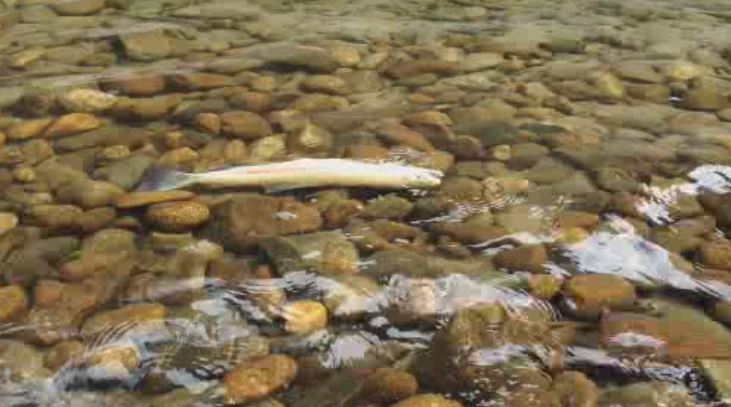Dried-up creek and stream beds are becoming a more common sight across the Okanagan — a concern for dwindling fish stocks.

“Fish will die so it’s very concerning. Fish need water to live”, said Karilyn Alex, a fisheries biologist with the Okanagan Nation Alliance.
Concerning stream flows are the subject of a three-day conference that got underway in Kelowna, B.C., on Wednesday.
“It is looking at the amount of water that we need to keep in the streams to keep the environment healthy, particularly for the needs for fish,” said Anna Warwick Sears, executive director for the Okanagan Basin Water Board.
Called the Environmental Flows Conference, the gathering has brought together 200 delegates from water management and research organizations, including fisheries and water managers, First Nations and local government policymakers.
“What we would like to see is people coming together before a crisis and looking at how much water is available for all the different purposes and having these kinds of conversations,” Warwick Sears said.
“We’re trying to come up with some ideas on how to make some, you know, better decisions.”
According to Alex, there are already very low fish numbers in numerous creeks across the Okanagan and in some waterways, entire genetic strains or runs of fish are at risk of being wiped out.
“It’s already at a critical point,” Alex told Global News.

Persistent drought conditions in the summer and fall of last year have impacted stream flows and if conditions don’t change soon, fears of another drought this year may materialize.
“We’re concerned about what the weather has in store for us this summer. We’re forecast to have another hot dry summer,” Warwick Sears said.
“The soil is very dry in the mountains, so the snowpack is probably going to soak into the ground a lot because the soil is so dry and so we’re concerned that there might be a really low stream flow here.”
Experts say it will take sacrifice — especially during drought years — to help the environment and fisheries cope.
That includes fish protection orders like the one implemented on the Salmon River in the North Okanagan last year to preserve water levels for spawning salmon.
- Posters promoting ‘Steal From Loblaws Day’ are circulating. How did we get here?
- As Canada’s tax deadline nears, what happens if you don’t file your return?
- Video shows Ontario police sharing Trudeau’s location with protester, investigation launched
- Solar eclipse eye damage: More than 160 cases reported in Ontario, Quebec
The measure impacted local farmers.
“The regulators came and told people to stop irrigating,” said Warwick Sears. “It’s a potential that could happen again this summer in different parts of British Columbia and potentially even in the Okanagan.”
It’s the type of enforcement that may be necessary if the general public doesn’t do its part in conserving water.
“We need stronger collaboration among the decision makers and we may need to change our perceptions about what we need,” Alex said.
“We feel like we need a lot more than maybe what we could use. We could probably live off a lot less. We could be better neighbours with fish, we could share better with them so that they could continue to survive.”
The conference runs until Friday.





Comments